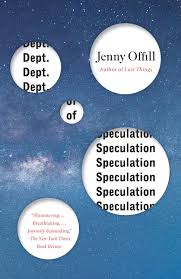 Lots of Nothing, Nicely Packaged
Lots of Nothing, Nicely Packaged
Offill, Jenny (2014). Dept. of Speculation. New York: Vintage (177 pp.)
The first 100 pages are almost entirely devoid of content, making this a 77 page “novel.” What chutzpah and what a great marketing job (Random House/Vintage).
The book is composed of short aphorisms, narrative snippets, and anecdotes, each a paragraph or two, written by the main character, an unnamed married woman in New York. She’s a writer, has a baby, and is chronically anxious, self-centered, and neurotic. This could be construed as her diary, and it has an epistolary feel, but more like a letter written, but not delivered, to the husband.
The entries roughly follow the rise and fall of the woman’s marriage. In the early part, she meets a guy, gets married, has a baby. The daughter learns to walk, has a party, learns to speak. Why any human being would find such utter banality interesting is beyond my comprehension.
Examples of the entries:
I went to a party and drank myself sick.
Are animals lonely? Other animals, I mean.
Some of the entries seem clearly directed toward the husband, although since he was present during the events annotated, the purpose of recounting them is unknown:
When we first saw the apartment, we were excited that it had a yard but disappointed that the yard was filled by a large jungle gym that we didn’t need…
I remember that day, how you took a $50 cab from work, how you held me in the doorway until I stopped shaking…
After you left for work, I would stare at the door as if it might open again.
As the entries continue, roughly chronologically, more nonsequiturs appear in the journal or letter, or poem, or whatever it is supposed to be:
What Simone Weil said: Attention without object is a supreme form of prayer.
Three things no one has ever said about me: You make it look so easy. You are very mysterious. You need to take yourself more seriously.
Around page 100, the husband becomes alienated, then it is revealed he has been having an affair. That’s no shocker, but at least it’s a relief from grinding quotidian banality. The narrator starts referring to herself in third person so if there ever was a hint that this was a diary, that idea is shot.
So how come it took her a month to think of her own question?
Is that what you think this is about?
Thales supposed the Earth to be flat and to float upon water.
The wife thinks the old word is better. She says he is besotted. The shrink says he is infatuated. She doesn’t want to tell what the husband says.
On it goes, a distant third-person narrator quoting and describing “the husband” and “the wife,” interspersed with pithy irrelevancies from Wittgenstein and Sartre. The entries start getting longer and actually more insightful, and in the last 75 pages we do start to get a feel for the narrator/character. Though she turns out to be a confused and unpleasant person, at least the reader has some interest in how she is revealed.
So, there’s no story to speak of, no character development, ordinary everyday language and mundane thoughts. What are the virtues? Mainly, we have typography. The formatting is mildly interesting, and the idea of telling a story in terms of brief journal entries is somewhat unusual, although it was done much, much better by David Markson in “Wittgenstein’s Mistress.” In the last third of the book there are some interesting character vignettes and a couple of moments of insight and humor, but the content remains sentimental cliché. I can’t really recommend this book, but it’s so short and quick to read that it doesn’t take any commitment to thumb through it and extract the few moments of good writing.
